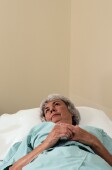Use of Medicare Skilled Nursing Benefit Is High at End of Life: Study
Financial concerns may deter many from using hospice provision, researchers say
 TUESDAY, Oct. 2 (HealthDay News) -- Instead of using Medicare's hospice benefits, many elderly Americans are spending their last months of life in a skilled nursing facility paid for through a different provision of the government-funded insurance program for seniors, according to new research.
Although most Medicare beneficiaries took advantage of their benefit for skilled nursing care for rehabilitation or care to prolong their life, scientists at the University of California, San Francisco, found that some dying patients are sent from the hospital to a skilled nursing facility for end-of-life care.
The researchers explained that, unlike the skilled nursing benefit, the hospice benefit forces patients to pay out of pocket for room and board. Although Medicaid, the government insurance program for the poor, would cover room and board, many do not qualify.
"Our finding that Medicare decedents commonly used [skilled nursing facility] care at the end of life suggests a need to better understand who is using the [skilled nursing facility] benefit and whether they are receiving care that matches their goals," the authors wrote. "Unfortunately, financial issues may contribute to why patients near the end of life are using the [skilled nursing facility] benefit and not the hospice benefit."
The research was published online Oct. 1 in the journal Archives of Internal Medicine.
The researchers analyzed data from the U.S. Health and Retirement Study, which is linked to Medicare claims from 1994 to 2007. The study included nearly 5,200 Medicare recipients, who died at an average age of 83.
The study revealed roughly 30 percent of the participants took advantage of the skilled nursing facility benefit in the last six months of their lives. About 9 percent died while enrolled in this benefit.
Use of the skilled nursing facility benefit was greater among patients 85 or older who had at least a high school education, were cancer-free, lived in a nursing home, used home health services and were expected to die soon.
"The hospice benefit is the primary way in which palliative care services are provided in nursing homes. A growing focus is on the development of palliative care in nursing homes alongside the current goals of functional improvement," the authors wrote. "Perhaps having Medicare pay concurrently for [skilled nursing facility] care and hospice services for the same condition could allow earlier incorporation of palliative care for these medically complex patients."
Dr. Peter Boling, of Virginia Commonwealth University in Richmond, said in the news release, however, that about half of the skilled nursing facility users ultimately went home, despite having significant frailty.
"We must all carefully avoid rushing to judgment and imposing end-of-life care protocols when reasonable vitality and quality of life remain, despite chronic illness burden," Boling said.
More information
The Centers for Medicare & Medicaid Services provides more information on skilled nursing care.

|